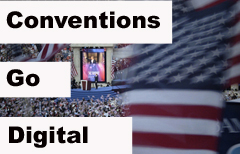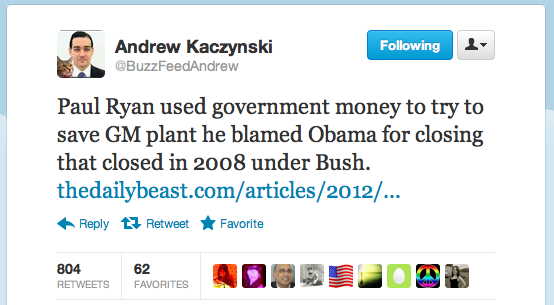
We are all fact-checkers now.
For years, Americans’ political press has been stuck in a fact-free model of neutrality, often covering even the most obvious lies as “one side” of a dispute. From Swift Boats and global warming to Iraq’s nonexistent WMDs, this coverage shrouds even rudimentary empirical claims in a fog of truthiness. But that may be changing.
As this year’s presidential campaign enters the homestretch after Labor Day, a new, aggressive model of fact-checking appears to be taking root. It is fast, aggressive and sometimes even outraged about falsehoods on the campaign trail.
Take Paul Ryan’s convention address last week. Ryan offered several misleading statements and a few obvious lies — falsehoods that he had to know were false — although there’s nothing new about politicians lying. Just look at Ryan’s fellow running mates: Sarah Palin lied about the Bridge to Nowhere in her convention address, for example, while during a nationally televised debate, Dick Cheney falsely said he had never met John Edwards, and Edwards falsely charged that the Bush administration lobbied to cut combat pay. They faced mild corrections and very little collateral damage for those high-profile statements.
This time, however, reporters did not let Ryan off the hook by noncommittally airing criticism (“opponents disagreed with his claims”), or reducing corrections to one of those stand-alone sidebars evaluating distortions (“three Pinocchios for the deficit commission history”). Instead, several authoritative accounts of Ryan’s address decided that his falsehoods were a key part of the news Ryan made, as these headlines show:

Mr. Ryan’s Misleading Speech (Washington Post)
Deficit Vow Lacks Specifics (A.P.)
Paul Ryan Address: Convention Speech Built On Demonstrably Misleading Assertions (Huffington Post)
Opinionated commenters were even harsher, focusing more on factual failure than ideological differences. Taken together, the overwhelming verdict on Ryan’s speech was that he should not be believed. (By one online measurement, on the day after the speech, the most widely cited convention articles led with the falsehoods.)
The Ryan-Romney campaign’s misleading welfare ads have drawn similar media condemnation. Ditto for the false claims that Obama raised taxes on middle-class Americans and, more darkly, the recurring, false suggestion that he was born abroad.
This newfound vigor for reporting facts over false equivalency — the very “truth vigilantism” that a New York Times public editor once presented as an optional challenge for today’s press — looks like a mainstay on the campaign trail.
Yet after years of complaints from media critics and ridicule from the media’s unofficial ombudsmen on Comedy Central, why is this happening now? A few interlocking trends suggest the reasons are both structural — campaigning in a digital era — and parochial, given the strengths of the two nominees.
Fact-Checking Has Gone Viral
This is the first national race in which Twitter is fundamentally altering campaign coverage. The message-sharing platform has upended how most political reporters watch the campaign.
Newt Gingrich used to deride Washington conventional wisdom as the product of what 500 people said to each other over lunch — nowadays, it’s more like what those people retweet. The pack mentality remains, but the backchannel is more visible and more subject to pushback. For reporters, that means fact-checking is not only faster, but it draws from a wider array of sources.
Returning to Ryan’s speech, for example, many of the most retweeted items from that night were not jokes or partisan attacks. They were simple messages about fact-checking. “Factory mentioned by Paul Ryan actually announced it’s closing before Obama took office,” declared a typical example from the Washington Post.
When that kind of information goes viral, it instantly stokes press and public attention on the politician’s fibs, and crowdsources part of a reporter’s homework. Separating exaggeration from dissembling takes time, but reporters can draw on credible Twitter sources for a head start. That makes it easier to instantly report the “news” of the candidate’s statements and a factual counternarrative.
The Press Oligopoly is Ending
While bloggers have been nipping at reporters for several campaign cycles, they have now fully arrived as credentialed colleagues. Some of today’s most successful campaign “bloggers,” like Nate Silver, promoted to the New York Times from the open-source user diaries of Daily Kos, or Ezra Klein, who joined the Washington Post after an impressive stint blogging for the American Prospect, specialize in providing quantifiable facts at breakneck speed. The interpretative emphasis is on evidence over opinion: Charts rule and canards are usually debunked before the regurgitation that politicians take for granted. It’s a different orientation than conventional campaign coverage, which often celebrates the horse race and prizes direct access to the principals, no matter what they are saying. And as empiricist blogging is integrated into the elite press, it provides credentialed competition that can both impact and supplant the conventional model.
“The fact-checking franchise has grown from a handful of specialists,” Jay Rosen, an NYU journalism professor, told MediaShift via email, “to something that every full-service news operation should do.” The contribution from sites and bloggers devoted to fact-checking, he said, “probably accounts for some of the intensity” of online fact-checking this cycle.
But still, you can’t fact-check much unless the facts are routinely in danger.
Romney, Obama and the Truth War
Finally, beyond any structural shifts, this year’s campaign also features two nominees with message strategies that have now been specifically honed to address today’s fact-checkers.
Romney is icing them out while Obama is cultivating them.
Faced with nearly unanimous rebukes for its welfare attack, the Romney campaign doubled down, making several more ads with the same claim. Then, its pollster flatly told the press that the campaign would not have its strategy “dictated by fact checkers.” That gambit — call it honesty about dishonesty or “cynical postmodernism” — may have taunted some reporters into even more assertive truth-squading. According to one source familiar with the White House’s thinking, Team Romney’s strategic mistake was not the lying, but offending the press.
For its part, the Obama campaign is now invested in veracity as a core attack. The president has plenty of impact over what issues are newsworthy, and his campaign is arguing that spin, lies and exaggerations show that the Romney-Ryan ticket can’t be trusted. As Buzzfeed’s Ben Smith recently argued, this “pants on fire politics” aims to bend the premium on accuracy into a political advantage. Smith said reporters should be wary of attempts to referee larger policy disagreements as if they were mere factual disputes. That’s not going to be easy.
Ari Melber is an attorney and correspondent for The Nation magazine (Contact via www.arimelber.com)

